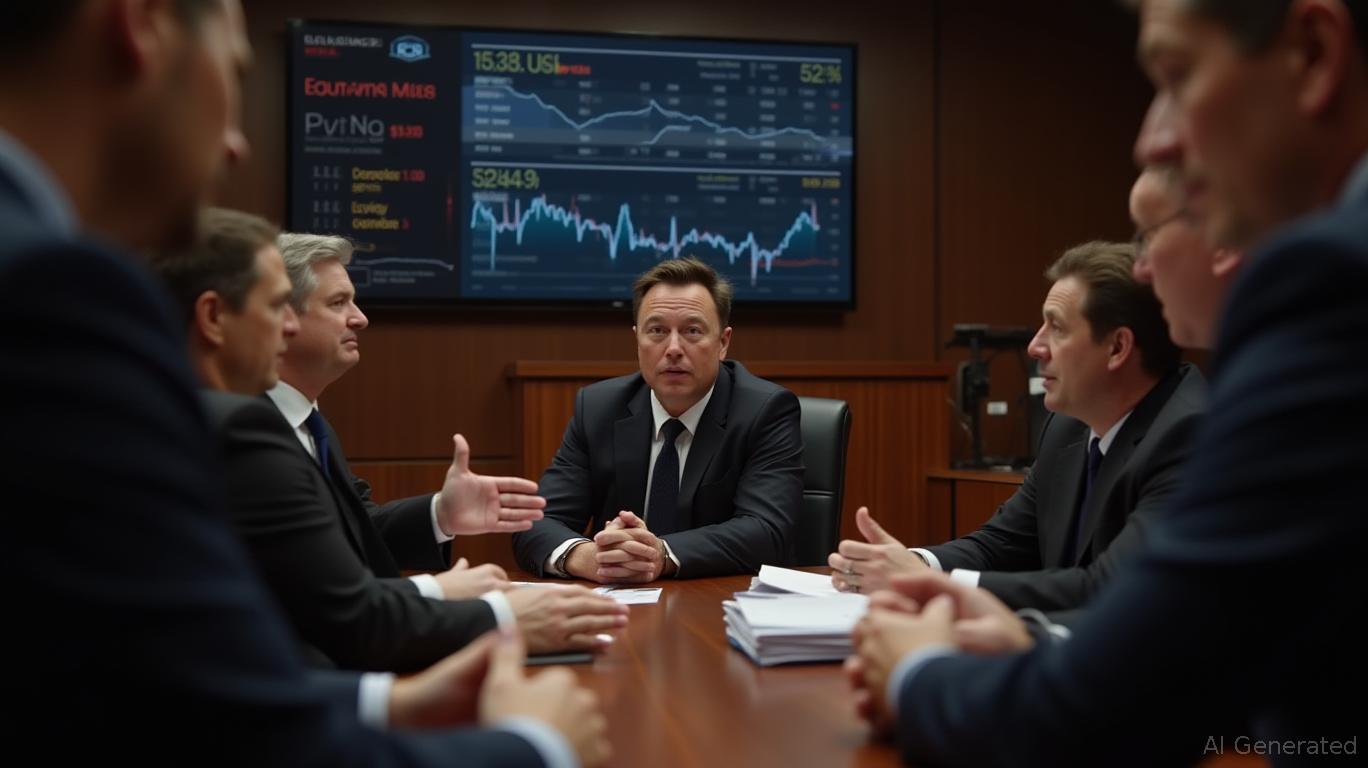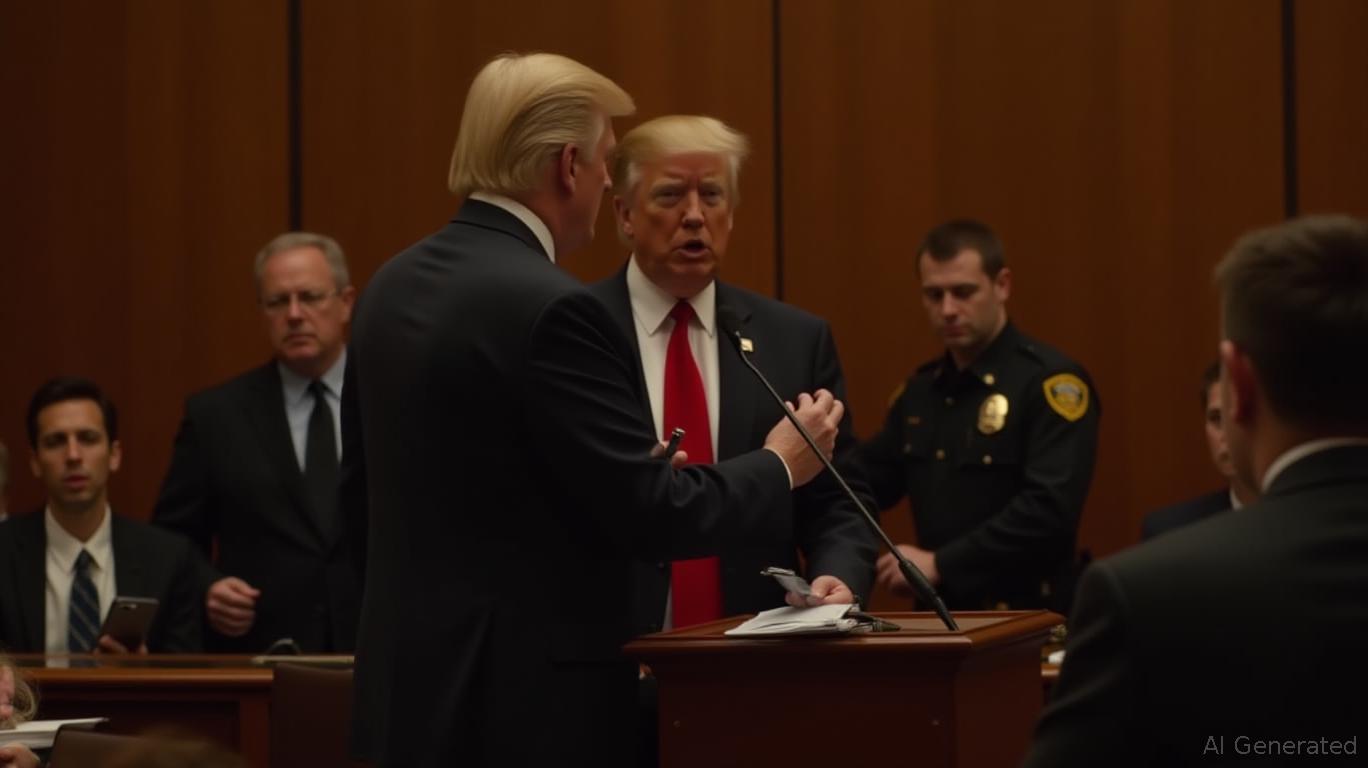Supreme Court and Tesla Investors Challenge Authority and Compensation in Fragmented Markets
- Supreme Court will review Trump's emergency tariffs under IEEPA on Nov 5, testing executive power limits amid conflicting lower court rulings. - Legal experts warn court's decision could redefine congressional-executive balance by validating or invalidating unilateral tariff authority. - Tesla shareholders vote Nov 6 on Musk's $1T pay package tied to AI/robotics milestones, facing governance criticism and potential leadership risks. - Both cases highlight polarized market dynamics: one testing judicial r
Stock futures rose on Tuesday as the market prepared for two major events: the Supreme Court's review of Donald Trump's emergency tariffs and
The Supreme Court will hear arguments on November 5 regarding consolidated lawsuits that challenge the legality of Trump's tariffs under the International Emergency Economic Powers Act (IEEPA). These cases, brought by importers and attorneys general from Democratic-led states, question whether the Trump administration exceeded its authority by imposing broad tariffs on nations such as Brazil, India, and Switzerland, as detailed by the Roosevelt Institute. Lower courts have reached different conclusions, with an 11-judge panel at the US Court of Appeals for the Federal Circuit unable to agree on whether IEEPA allows for such tariffs, the Roosevelt Institute notes. The matter has become a key test for the Supreme Court's conservative majority and its "major questions doctrine," which restricts executive action on significant economic matters—a standard previously used to block Biden's student loan forgiveness plan, as described in a

Legal experts point out that the decision could redefine how power is shared between Congress and the president. If the court rules against the tariffs, it would confirm that Trump's actions lacked legal backing and reinforce limits on unilateral presidential moves, according to the Roosevelt Institute. On the other hand, upholding the tariffs could encourage future presidents to use emergency powers for sweeping policy changes, raising questions about congressional oversight, as highlighted in the Vox analysis. The Trump administration has also used other legal tools, like Section 301 investigations, to create a "parallel structure" that lets it keep certain tariffs in place even if others are struck down, as reported by
At the same time, Tesla shareholders are preparing for a crucial vote on November 6 regarding Musk's $1 trillion pay proposal, which is tied to ambitious targets such as reaching an $8.5 trillion market value and progress in AI and robotics, according to the Hans India article. Board Chair Robyn Denholm has cautioned that turning down the plan could prompt Musk to leave, putting Tesla's "visionary leadership" at risk as it shifts toward becoming an AI-focused tech company, as reported by
Musk has responded by threatening to devote more attention to SpaceX and
Both situations highlight the challenges of reaching consensus in a divided market. For the Supreme Court, the tariffs case will show whether the major questions doctrine is applied impartially or used for political purposes, as raised in the Vox analysis. For Tesla, the shareholder vote will determine if executive pay should be tied to transformative achievements or if it risks setting a precedent for excessive compensation, as the Hans India article points out. As investors await the results, the decisions could have lasting effects on trade, business strategy, and governance standards.
Disclaimer: The content of this article solely reflects the author's opinion and does not represent the platform in any capacity. This article is not intended to serve as a reference for making investment decisions.
You may also like
XRP News Today: Ripple’s Enhanced Custody Initiative Seeks to Open Up the Corporate Cryptocurrency Market
- Ripple acquires Palisade to expand institutional custody capabilities, enhancing secure, scalable digital asset solutions for corporates and fintechs. - Integration of Palisade's MPC security, zero-trust architecture, and multi-chain support enables high-speed transactions and compliance-driven treasury management. - CEO Monica Long highlights secure custody as critical for corporate crypto adoption, combining Ripple's vaults with Palisade's tech for end-to-end institutional solutions. - The $4B strategi

Trump’s Cryptocurrency Pardons Ignite Ethics Controversy Amid Growing Family Wealth
- Trump's pardon of Binance founder CZ Zhao sparks ethics debates over conflating presidential power with family crypto profits. - The $2B World Liberty Financial deal linking Trump's sons to Binance-affiliated entities intensifies conflict-of-interest scrutiny. - Democrats demand congressional review as Trump family's crypto ventures generated $802M in 2025, surpassing traditional business income. - Ethics experts warn of "novel conflicts" as Trump promotes crypto dominance while family profits from opaqu

XRP News Today: Ripple’s $1 Billion Stablecoin Forges Connection Between Crypto and Traditional Finance
- Ripple's RLUSD stablecoin surpassed $1B market cap, driven by institutional adoption via Ripple Prime's OTC trading platform. - Dual-chain deployment on Ethereum/XRP Ledger and NY Trust compliance enhance RLUSD's utility for cross-border payments and DeFi. - Acquisition of Hidden Road (Ripple Prime) created first crypto multi-asset prime broker, enabling cross-margin trading with traditional instruments. - SEC dispute resolution and strategic infrastructure focus position RLUSD/XRP as foundational assets

Can Artificial Intelligence Outsmart the Fluctuations in Cryptocurrency? Google's Prediction for SHIB Ignites Discussion
- Google's Gemini AI predicts Shiba Inu (SHIB) could reach $0.000031 by November 2025, citing DeFi growth and institutional interest in meme coins. - The forecast analyzes market trends, social sentiment, and blockchain data but faces skepticism over volatility and unpredictable factors like regulation. - Critics highlight SHIB's speculative nature, noting past 50% weekly swings and AI's inability to account for irrational market behavior. - Mixed community reactions and regulatory risks underscore the deb
